Entries Tagged 'Chinois' ↓
March 28th, 2009 — Chinois, Mauritius, Reflexion
Mi chinois, métis, que je suis, ou banana que d’autres prétendent que je suis, j’ai le désire profond de sonder l’âme chinoise. Dans ce brouhaha des écrits des textes fondateurs de la chine depuis de millénaires, peut on en tirer une philosophie chinoise qui pourrait élucider ses agissements type chinois comme nous decryptons par exemples,des façons de faire des européens du basin méditerranéen.
La chine vaste et multi ethnique me semble avoir une culture culture et unefaçon de penser car la magnitutude du territoire et peuplades font la difference.
Hakka que je suis, forgé par ma tradition familiale, j’agis bien souvent dans mon inconscient dans un registre qui est ancré en moi par mon héritage culturel vécu. Mon souhait c’est bien là de déceler et si possible de comprendre les codes, concepts, logiques qui fait mon univers mentale.
Comme je n’ai comme langues que le français et l’anglais, le Kreole,et ma la langue maternelle Hakka, je suis conscient que mes acquisitions de connaissances et mes réflexions sont voiles par les filtres des langues utilisés et m’exclut des nuances qui ne sont exprimées ou implicitees dans les textes originaux. Cela me fait penser souvent a ODED EL DAD, illustre professeur qui en français nous traduit la version hébraïque du récit de Caen et Abel , donnant ainsi des valeurs tout autre que la lecture du texte en français.
Existe-t-il une philosophie chinoise ? Qu’entendons nous par philosophie à la mode, gréco-occidental, ou la pensée à la chinoise ?
Je me régale en lisant un texte qui met en exergue les idées exprimes dans les écrits des nombreux auteurs autour de la pensée chinoise. Anne Cheng, dans La pensée en chine; Francois Julien, dans Chemin faisant, connaitre la chine, relancer la philosophie ; Jean Luc Domenach dans le retour ambigu de la chine en Asie ;Joel Thoraval, sinologue connu dans de la philosophie en chine a la chine dans la philosophie ; Mou Zongsan, dans neo-confucianisme ;et tous une pléiade de penseurs chinois contemporains tel Liu Xiaofeng, Gan Yang, Liang Shuming et autres.
En résume je retiens une citation:
Pour reprendre l’expression du sociologue et politologue Gil Delannoi « toutes les lunettes méritent d’être essayés, lunettes de la ressemblance, les lunettes da la différence ». En d autres termes, certaines approches se révèlent communes aux chinois et aux européens, d’autres sont différentes. Des idées comme celles de sagesse, de liberté intérieure, d’autonomie morale ou bien public se trouvent dans la pensée chinoise comme dans celle de l’Europe ancienne.
Certaines oppositions originelles paraissent cependant absolues. En occident, par exemple, les sociétés dérivent plutôt d’un modèle pastoral dont elles ont hérité l’impératif du commandement, du volontarisme. La société chinoise, au contraire, procède d’un modèle agricole, végétal, fondé sur la patience, et la maturation. Dans le premier modèle, la parole et la voix sont décisives, tandis que, que dans le second, « l’écrit est antérieur à l’oral et possède, dans la composition combinatoire de signes eux-mêmes (la composition graphique des caractères) sa base normative ». Pour la philosophie grecque, l’opposition entre la contemplation et l’action est clairement affirmée, tandis qu’en Chine prévaut l’idée de processus continu, de fluidité, de mutation infinie. Il est vain de tirer une plante en espérant la faire pousser plus vite, dit un adage chinois.
Eh bien je suis ravi, cela m’a donne l’image d’un Hakka écologique, vegetal, vivant dans un univers qui mute en processus continue, très plastique capable de se transformer s perpétuité au guise de son environnement. Est-ce là le modèle de Kreole Morisien que nous cherchons ?
March 24th, 2009 — Chinois, Reflexion
I just love it.
My chinese ancestry is boiling in me.
The chinese language and the creative hand of God
by Ethel R. Nelson, M.D.
Who among all these [God’s creatures] does not know That the HAND OF THE LORD has done this, In whose HAND is the life of every living thing, And the breath of all mankind? Job 12:9,10, NKJV
Few realize that the early Chinese (c. 2200 B.C.) worshiped a Creator-God, the Heavenly Ruler. Fewer still have appreciated the “second Genesis” which their ingenious ancient character writing contains. 1 The 4,000-year-old Imperial Sacrifice ceremony observed annually by China’s reigning emperors attests to their original post-deluge patriarchal connections. 2 A word-of-mouth knowledge of God (even the Trinity), the Creation, Garden of Eden, and Fall of man, could have come to them from Adam via Lamech, Noah’s father; and Noah’s son, Shem, the probable Chinese progenitor.
February 16th, 2009 — Chinois
Hu jin tao is on a state visit. Why is Mauritius on the list of 5 nations , Saudi Arabia, Senegal, Mali, Tanzania? This is his second trip to Africa since the 2006 Beijing Summit of the Forum on China-Africa Cooperation.
The two day visit is going to disrupt our usual routine and mark the visit of one of the most influential person of the world. School children and civil servants will be on leave and the main roads closed to traffic. Is it too much fuss for the event?
We have been told that this is the security norm for a state visit. Mauritius does not want something dramatical to President Hu to happen during his visit and we want him to be impressed by Mauritius as a hospitable and friendly nation. Let us be realistic, who has more to gain out of this visit?
Being a China born person, I personally feel a sense of connection to China. I see the progress of China in world affairs as justified not because of my back ground but more importantly because China has the largest population of the world.
Let us enjoy his visit and hope that the ties between our two nations get even stronger.
January 30th, 2009 — Chinois, Family stories, People
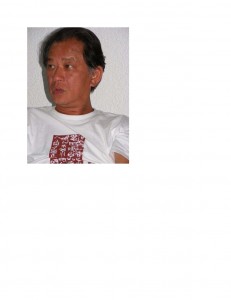
J’ai eu le grand plaisir de passer la soirée d’hier à la Mi Voie en très bonne compagnie. Aken nous a rejoint à la fin du dîner pour le dessert et le café. La soirée était agréable tant par rapport au cadre de la région ouest de l’ile, dans une température idéale accompagnée une petite brise juste assez pour nous repousser les moustiques et faire rejaillir les senteurs, si suaves des plantes du jardin donnant sur la terrasse ou nous étions installés, sous la voûte céleste sans nuages timidement illuminée d’un croissant de lune que tant par la convivialité des amis présents.
Étant encore dans le cadre de la Fête du printemps, notre conversation fit un moment sur l’année du bœuf qu’aussi bien que sur la question politique. J’etais content d’écouter Aken sur la question. Voici selon ses propres mots, ses délires :
L’année du Rat arrive à échéance et le buffle qui va suivre aura besoin de beaucoup plus de courage que d’habitude. Si le Rat est signe d’intelligence et d’opportunisme, il n’est pas besoin de démontrer la capacité de travail du buffle, ainsi que son sens du devoir si son maître l’a bien traité et orienté. Contrairement au monde occidental, le Rat n’est pas vu comme un fléau qui ramène des épidémies. Sous contrôle « naturel et cosmique », il est signe d’abondance de grains au grenier, grâce d’ailleurs au gros travail effectué avec la collaboration du buffle. Selon une certaine légende, si le Rat est arrivé le premier, c’est tout simplement parce qu’il ne s’est pas fatigué lors de la convocation des animaux pour déterminer le cycle du calendrier lunaire et ce, dans l’ordre cosmique de la nature. Il aurait tout simplement monté sur le dos du Buffle pendant tout le parcours et ainsi arrivé pépère et fringant après que le Buffle eût assidûment fait tout le travail. Mais bon, ce ne sont que des légendes.
Quoique ? Retenons deux éléments seulement pour les ramener au contexte politique local de Maurice : l’intelligence et l’assiduité. Qui des leaders actuels peut réunir ces éléments pour motiver le pays entier à se retrousser les manches ? Oui, le pays entier, nous, puisque la tâche qui nous attend (quel que soit notre signe dans le calendrier lunaire) sera particulièrement dure dans les années à venir suite au tsunami financier que le monde a subi ces derniers temps ?
Restons en aux deux principaux leaders. Peut-on raisonnablement affirmer que l’actuel PM n’a pas fait preuve d’intelligence alors qu’il a la réputation d’être un « artiste » dans les calculs stratégiques pour gagner et garder son électorat, par exemple ? Que son équipe de proches conseillers ne sont que des paresseux et profiteurs (même s’il y en a certainement) ? Peut-on par la même occasion nier le fait que le vrai leader de l’opposition n’est pas « un Buffle » au travail ? Que ses collaborateurs ne sont que des « yesman » face à un rouleau compresseur en matière de courage au travail, d’idées et d’initiatives ? Maurice continue à être parmi les exemples cités dans les milieux internationaux. Honnêtement, c’est aussi grâce à tout ce beau monde qui y a apporté, chacun en son temps, sa contribution.
Comment maintenir ce cap et même faire mieux qu’avant, sans démagogie et durablement ? Il y en a des tas du côté des deux tendances politiques et de même si on élargit à d’autres tendances qui peuvent y contribuer. Ainsi, pour le travail qu’il y a à faire afin que Maurice devienne l’exemple de développement durable, il y a nécessairement besoin d’un certain consensus (voir mon article paru dans l’Express du 22 octobre dernier à ce propos.) Il y a aussi nécessité d’arriver au même consensus pour continuer à développer le pays tout court.
Certains ont déjà exprimé directement ou indirectement le vœu que ce pays soit dirigé de la manière suivante : Navin comme PM et le moustachu comme vice-PM. Ne serait-ce pas l’idéal des meilleurs scénarios que l’on pourrait espérer ? Ils vont sûrement y aller chacun de leur côté avec leur propre parti et partisans respectifs pour exciter les masses et gagner le maximum de voix. C’est tout à fait possible qu’après le comptage des voix, la démagogie fasse place à l’intelligence et à l’assiduité au travail. Dans le contexte actuel, cette idée pourrait paraître saugrenue, impensable et limité à un nombre restreint de personnes. L’élite intellectuelle, notamment. Si c’est bien le cas, cette élite devra aussi se retrousser les manches et faire son devoir de citoyen pour pousser à ce que l’intelligence et le courage au travail prennent le dessus sur la démagogie politique. Les « hurleurs » politiques vont crier : « impossible, nous n’avons pas la même vision idéologique, pas les mêmes ambitions …… pour sauver le pays, pour le bien de la nation toute entière et, par la même occasion, pour le « bonheur du peuple ». D’autres vont chercher à savoir qui est plus Rat ou Buffle dans le profil de ces deux leaders. L’heure n’est plus à ces réflexions de bas étage. D’ailleurs, ce calendrier lunaire a le mérite de permettre à chacun d’entre nous de s’y retrouver en bonne harmonie dans cette grande tradition millénaire de l’ordre cosmique des choses. C’est ce qui a permis à un peuple travailleur qui tient compte de cette tradition de réaliser certaines grandiosités que l’humanité entière reconnaît.
L’intelligence et le travail au pouvoir : souhaitons le. Avec de la bonne foi, « yes, we can » puisque c’est d’actualité. N’attendons pas la prochaine année du Rat (12 années, il se passera assurément beaucoup de choses) et souhaitons donc pleinement Kung Xi Fa Zhai à l’intelligence et à l’assiduité des mauriciens, « morisyin, malin sa ».
Aken WONG
January 14th, 2009 — Chinois, Family stories, Mauritius, Uncategorized
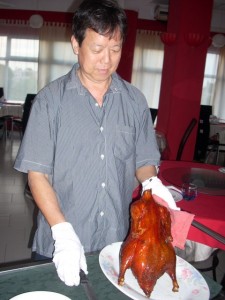
As we move into the Chinese New Year period which this year will be on the 26th January, the rejoicing and joyful parties continue on. Last week end, a great dinner party with the relatives was followed the next day by the Thanks giving dinner ( Van Shin ) of the Chan clan organised the Oy Kin Sa society. Monday evening was another great Peking Duck dinner with my wife’s relatives. I have to restraint my eating in the face of such rich and appetising dishes. More delicious dinners are on for the coming weeks!
I posted on my face book the dishes I had at the Van shin dinner which were typical Hakka dishes: Steam Chicken through Shark fins soup to dried vegetable stew belly pork. Some of my overseas friends on seeing the photos were dying for these dishes. As a dream the flavour and smell were oozing out of the slight blurred pictures and creating induced gastric stimulation of the stomach. From Norway: “all smells very good, but pictures are a little blurry.”From Montreal Canada: comment about your photo in the album “Chinese Hakka meal @ King Palace”:”ayo to faire moi gagne faim!”
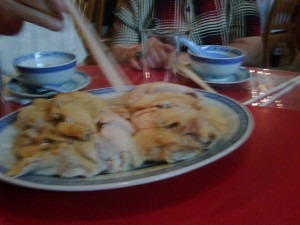
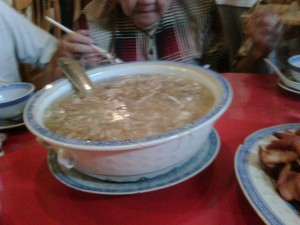
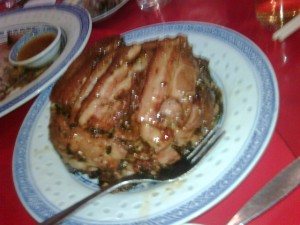
January 6th, 2009 — books, Chinois
In their dwellings, they love the earth.
In their hearts, they love what is profound.
In their friendship, they love humanity.
In their words, they love sincerity.
In government, they love peace.
In business, they love ability.
In their actions, they love timeliness.
It is because they do not compete
that there is no resentment.
Those who know others are wise.
Those who know themselves are enlightened.
Those who overcome others require force.
Those who overcome themselves need strength.
Those who are content are wealthy.
Those who persevere have will power.
Those who do not lose their center endure.
Those who die but maintain their power live eternally.
The more restrictions there are, the poorer the people.
The more sharp weapons, the more trouble in the state.
The more clever cunning, the more contrivances.
The more rules and regulations, the more thieves and robbers.
Therefore the wise say,
“Do not interfere, and people transform themselves.
Love peace, and people do what is right.
Do not intervene, and people prosper.
Have no desires, and people live simply.
These are wise words from the Chinese philosopher from Sanderson Beck
December 29th, 2008 — Ayurveda, Chinois
In my earlier blog, in April 2007, I wrote about laser puncture therapy which I underwent in France some time back. Whilst there is gain of interest in alternative medicine in the western world, there is definitely a greater interest in taking care of one’s body. This is one of the thesis of Professor Maffesoli when he explained that there is greater awareness of our body. Michel Serres , another great thinker of our time also wrote extensive of the accrued awareness of our physical body. Preventive care of one’s body is ever increasing. During my last visit to Singapore where I visited my uncle who had a similar stroke, I understood that besides his routing twice weekly physio-therapy his doctors advised a weekly session of acupuncture for his general health. Does acupuncture re-establish the functioning of your vital organs? Practitioners of reflexology and massages vouch that regular massages does promote well being. Now I am having my weekly session of foot reflexology by my brother in law, David.
I am of opinion that if one can save himself from taking in drugs and use alternative care instead, one should be healthier. Drugs while curing some ailments necessarily have disruptive effects elsewhere. We know for use that pain killers in whatever form taken, relieves the patient but taken in the long term has adverse effects on other part of our body. I am a great believer of the harmony of the body. Our body has the capacity of readjusting to restore a balance within itself much like water always goes back to find its own level.
Ancient Chinese Healing Method for Stress and Diseases
Acupuncture, as an alternative medical practice, is now making headway in the Western world. It is now accepted as a drug-free treatment and method of stress relief. Practiced in China for more than 2,000 years, acupuncture is a therapeutic system that makes use of sterilized needles for the purpose of restoring the body’s equilibrium. The needles are inserted on specific vital points that correspond to a specific internal organ. The light insertion of the needle into a vital point is supposed to free the flow of internal energy or “chi.†According to Chinese medical theory, any blockage in the flow of chi in the body’s “energy streams†or meridians can an imbalance in the body — resulting to an illness. The natural flow of chi ensures a person’s general state of health. The focus of acupuncture is on restoring harmony in the flow of the chi throughout the body and, in the process, balancing the metaphysical concepts of yin and yang.
Acupuncture is used to treat a wide range of ailments such as nausea, sinusitis, migraine headaches, lower back pain, knee pain, and chronic pain. Ancient Chinese texts also claim that the acupuncture can be used to treat minor mental and emotional problem such as anxiety disorder. For this reason, some even compare the Traditional Chinese Medicine method of acupuncture to the Western medical discipline of psychology. Both are seen as similar disciplines or therapy methods that have a positive effect on the mental health of patients.
The true benefits of acupuncture are found in its efficacy as a non-invasive, drug-free means of alleviating a number of physical ailments. It is also used in conjunction with traditional Chinese herbal cures that are perceived to be as effective as modern pills and medication. Acupuncture is concerned not only with providing cure to specific ailments. It is also used to determine the causes of physical discomforts and illnesses. Acupuncture practitioners make use of body charts that show the meridians or channels where internal energy flows to different parts of the body. These meridians correspond to the Western medicine layout of the central nervous system and circulatory system.
Studies are still being made by Western doctors and other scientists to determine the efficacy of this Eastern alternative form of healing. Even if acupuncture already accepted in different parts of the world as an alternative healing method, some quarters are still skeptical about its long-term effects.
While there are still no research findings that make the curative claims about acupuncture absolutely undisputable, it is interesting to note the depth of understanding that the Chinese had about the inner workings of the human body thousands of years before the formal organization and practice of Western medicine. Perhaps, one day, scientists will finally prove that the differences between Eastern and Western medicine is found mostly in culture and terminology; and that both systems are actually alike in terms of philosophy and theory in the use of the needle as a tool for healing.
A blog which I regularly read.
December 27th, 2008 — Chinois, Family stories, Uncategorized
When I tell my non Chinese friends that I have the family history back for 24th generations, they are amazed. The reality is that my ancestors had the fore sight of planning their descendants. I rejoiced on reading an article published on L’Aurore, the Catholic Mission monthly magazine December issue No 125, by one of my distant cousins of the same clan Chin who explained how generations’ names were generated. Just like YIP TONG does not carry the clan name, the author of the article Leung Shing names was truncated by the civil status officers of the time when our ancestors landed in Mauritius.
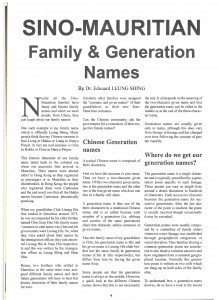
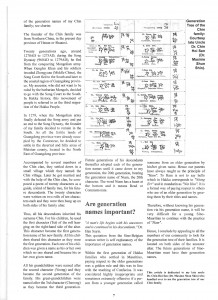
November 22nd, 2008 — Chinois, Mauritius
Last night with very great pleasure, I attended the 100th year celebration of the Chinese chamber of Commerce in Mauritius. Our family has always participated to the chamber activities. Grand farther, YIPTONG, founder of the family in Mauritius was himself President of the chamber in 1938.
The very able and dynamic President in her speech made a review of the achievements of the chamber and repositioned the vision of the chamber in the perspective of the future with its new challenges. She concluded her speech in wishing the chamber to live up another 100 years.
Objectives of the chamber
To protect and promote the business interest of the Chinese Community in Mauritius
To represent the interest of members vis a vis governmental and non governmental authorities
To promote interaction among traders and industrialists
To facilitate meetings between members and their foreign counterparts
To promote business activities, local and overseas, for the benefits of traders and industrialists
To promote benefits to members of the Chinese Community, during sickness or infirmity or old age and death
From the Souvenir magazine produced for the occasion,I went through the list of founder members and the list of Past Presidents. I found it most interesting to see the names of the persons.
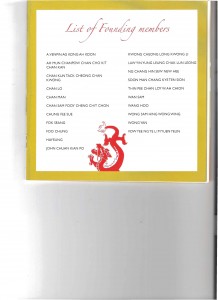
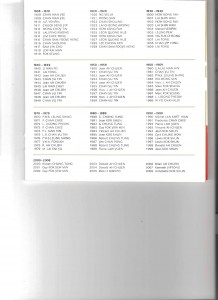
August 29th, 2008 — Chinois, People, Reflexion
I took much pleasure in reading my preferred columnist of the New York Times:
A Biblical Seven Years
By THOMAS L. FRIEDMAN
Beijing
After attending the spectacular closing ceremony at the Beijing Olympics and feeling the vibrations from hundreds of Chinese drummers pulsating in my own chest, I was tempted to conclude two things: “Holy mackerel, the energy coming out of this country is unrivaled.†And, two: “We are so cooked. Start teaching your kids Mandarin.â€
However, I’ve learned over the years not to over-interpret any two-week event. Olympics don’t change history. They are mere snapshots — a country posing in its Sunday bests for all the world too see. But, as snapshots go, the one China presented through the Olympics was enormously powerful — and it’s one that Americans need to reflect upon this election season.
China did not build the magnificent $43 billion infrastructure for these games, or put on the unparalleled opening and closing ceremonies, simply by the dumb luck of discovering oil. No, it was the culmination of seven years of national investment, planning, concentrated state power, national mobilization and hard work.
Seven years … Seven years … Oh, that’s right. China was awarded these Olympic Games on July 13, 2001 — just two months before 9/11.
As I sat in my seat at the Bird’s Nest, watching thousands of Chinese dancers, drummers, singers and acrobats on stilts perform their magic at the closing ceremony, I couldn’t help but reflect on how China and America have spent the last seven years: China has been preparing for the Olympics; we’ve been preparing for Al Qaeda. They’ve been building better stadiums, subways, airports, roads and parks. And we’ve been building better metal detectors, armored Humvees and pilotless drones.
The difference is starting to show. Just compare arriving at La Guardia’s dumpy terminal in New York City and driving through the crumbling infrastructure into Manhattan with arriving at Shanghai’s sleek airport and taking the 220-mile-per-hour magnetic levitation train, which uses electromagnetic propulsion instead of steel wheels and tracks, to get to town in a blink.
Then ask yourself: Who is living in the third world country?
Yes, if you drive an hour out of Beijing, you meet the vast dirt-poor third world of China. But here’s what’s new: The rich parts of China, the modern parts of Beijing or Shanghai or Dalian, are now more state of the art than rich America. The buildings are architecturally more interesting, the wireless networks more sophisticated, the roads and trains more efficient and nicer. And, I repeat, they did not get all this by discovering oil. They got it by digging inside themselves.
I realize the differences: We were attacked on 9/11; they were not. We have real enemies; theirs are small and mostly domestic. We had to respond to 9/11 at least by eliminating the Al Qaeda base in Afghanistan and investing in tighter homeland security. They could avoid foreign entanglements. Trying to build democracy in Iraq, though, which I supported, was a war of choice and is unlikely to ever produce anything equal to its huge price tag.
But the first rule of holes is that when you’re in one, stop digging. When you see how much modern infrastructure has been built in China since 2001, under the banner of the Olympics, and you see how much infrastructure has been postponed in America since 2001, under the banner of the war on terrorism, it’s clear that the next seven years need to be devoted to nation-building in America.
We need to finish our business in Iraq and Afghanistan as quickly as possible, which is why it is a travesty that the Iraqi Parliament has gone on vacation while 130,000 U.S. troops are standing guard. We can no longer afford to postpone our nation-building while Iraqis squabble over whether to do theirs.
A lot of people are now advising Barack Obama to get dirty with John McCain. Sure, fight fire with fire. That’s necessary, but it is not sufficient.
Obama got this far because many voters projected onto him that he could be the leader of an American renewal. They know we need nation-building at home now — not in Iraq, not in Afghanistan, not in Georgia, but in America. Obama cannot lose that theme.
He cannot let Republicans make this election about who is tough enough to stand up to Russia or bin Laden. It has to be about who is strong enough, focused enough, creative enough and unifying enough to get Americans to rebuild America. The next president can have all the foreign affairs experience in the world, but it will be useless, utterly useless, if we, as a country, are weak.
Obama is more right than he knows when he proclaims that this is “our†moment, this is “our†time. But it is our time to get back to work on the only home we have, our time for nation-building in America. I never want to tell my girls — and I’m sure Obama feels the same about his — that they have to go to China to see the future.
I can only agree fully to Thomas Friedman’s Editorial on all three counts:
1. The energy coming out from China is unrivaled.
2. For seven years China has been preparing for the Olympics, they put in their efforts and might to build their nation whilst America has been for the last seven years postponing the build up of the nation. The Americans were too busy sorting out terrorism.
3. Let Obama bring the wind of change. Let him proclaim the moment and time of nation building in America.








